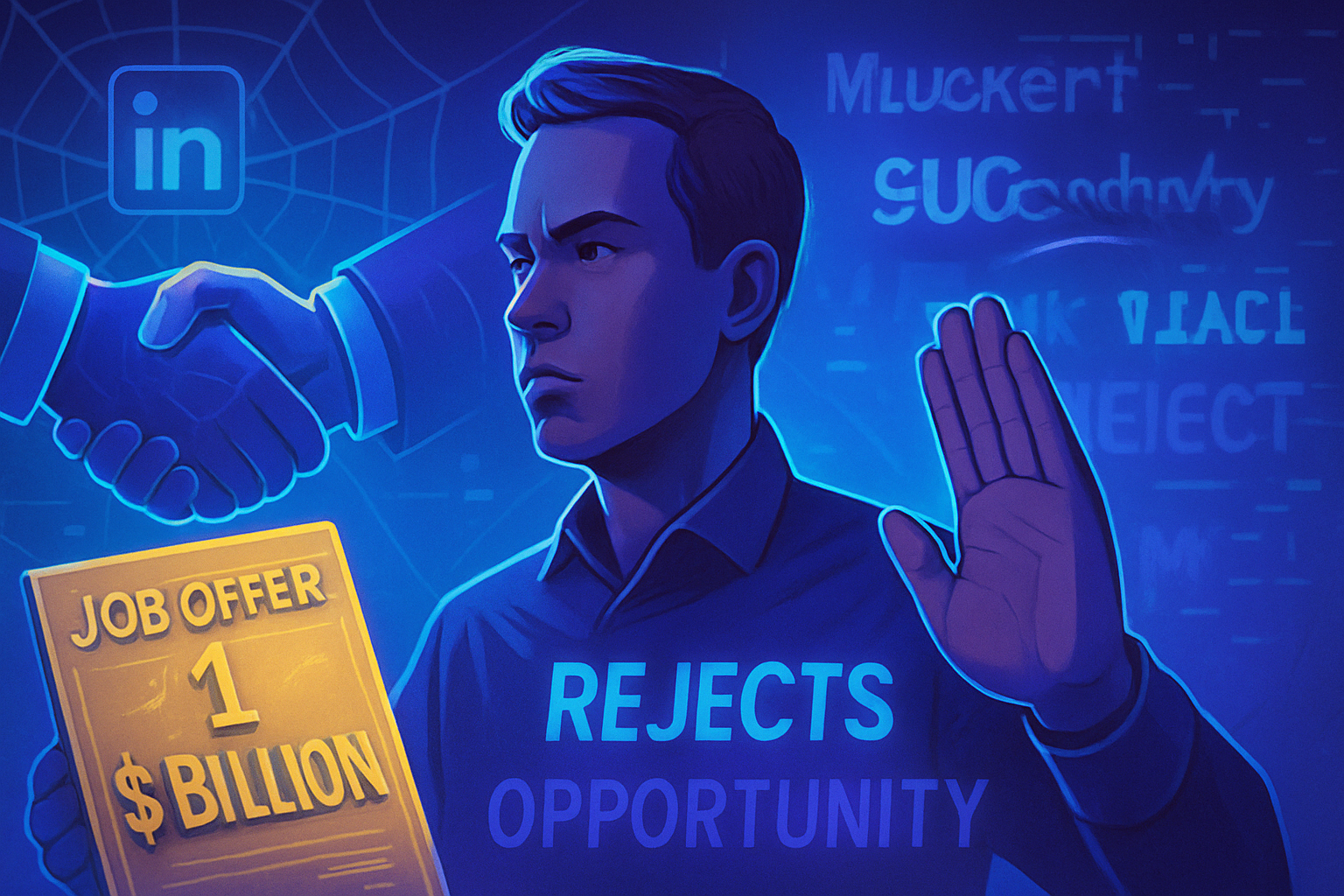Andrew Tulloch, machine learning expert, refuses a colossal offer from Mark Zuckerberg. This bold choice resonates through Silicon Valley and redefines personal values in the face of monetary temptation. His impressive journey, detailed in a now-viral LinkedIn profile, illustrates a career where innovation takes precedence over *financial outlooks*.
Andrew’s decision, which could cost him $1.5 billion, calls into question industry norms. A rare occurrence, even in an environment where nine-figure salaries are fascinating. Inviting notoriety and rational determination intertwine in his meteoric rise.
A bold choice
Andrew Tulloch, an Australian computer scientist, recently captivated the tech community’s attention. He turned down a job offer worth $1.5 billion from Mark Zuckerberg, founder of Meta. This decision raised eyebrows due to the exceptional amount it represented.
An exemplary career
With a prestigious background, Tulloch graduated from Cambridge University. He started his career as a strategist at Goldman Sachs, already scratching the heights of finance. After an 11-year stint at Meta, he focused his efforts on artificial intelligence, particularly in the field of machine learning.
Transfer to OpenAI
In October 2023, Tulloch left Meta to join OpenAI, known for its technological breakthrough with ChatGPT. His transition to this company reinforced his commitment to AI innovations and his desire to push current boundaries. He then made the leap to Thinking Machines Lab, an AI startup that quickly gained attention in Silicon Valley.
A controversial offer
The phenomenon gained traction when sources revealed the amount of Meta’s offer, which could have netted Tulloch up to $1.5 billion over six years. However, this amount is contingent on performances such as bonuses and stock valuation. Meta spokesperson Andy Stone described this depiction of the offer as “inaccurate and ridiculous”, adding that any compensation package depends on stock increases.
A viral journey
Tulloch’s LinkedIn profile went viral, showcasing his impressive ascent from Goldman Sachs to Thinking Machines Lab. His work experience at Facebook, where he developed machine learning systems for advertising, attests to his skills and expertise in the field. On his personal website, Tulloch claims to hold a degree with distinction in mathematical statistics from Trinity College, further enhancing his academic stature.
Aspiring ambitions
Thinking Machines Lab, co-founded by Tulloch, aims to go beyond traditional chatbots and redefine AI. This ambition comes at a time when the race for artificial intelligence is fiercer than ever. The renowned Zuckerberg, aware of this potential, has attempted to lure researchers from TML to his new superintelligence project, but to no avail thus far.
The current technological dynamics
Andrew Tulloch’s situation illustrates crucial challenges in the tech industry. The competition for talent is at its peak, as companies vie to attract the best AI experts. While companies like Meta attempt to encroach on the innovative stage of other startups, Tulloch’s independence reflects an entrepreneurial vision and a bold strategy in the world of AI.
Future implications
Tulloch’s choice to refuse such an offer embodies a significant movement in modern corporate dynamics. This may inspire other professionals to consider alternative paths, prioritizing innovation and development over financial incentives. The ramifications of this decision could potentially redefine values in the tech sector, favoring a long-term-oriented approach.
Integration into the media landscape
Discussions surrounding Tulloch and his refusal of a lucrative offer are spreading within the tech sphere, extending to analyses of daily challenges such as managing artificial intelligence. Resources like the challenges faced by CIOs and other insights on the evolution of artificial intelligence amplify this dynamic. Recent articles also reveal legal challenges that AI companies must face, as exemplified by the litigation between Elon Musk and OpenAI.
Ethical and professional issues
The repercussions of Tulloch’s decision transcend the mere framework of salary negotiation. The ethical dilemma posed by exorbitant pay for AI experts raises fundamental questions about the values of a rapidly growing industry. In an era where national security becomes paramount, efforts like the launch of new AI models add a layer of complexity to the discussion.
A promising future
As Tulloch continues his journey at Thinking Machines Lab, he remains a model of determination and innovation. His trajectory speaks to the limitless possibilities offered by the field of artificial intelligence. The tech professional community will continue to watch with interest his upcoming initiatives, hoping that his leadership will mark a turning point in the future of the sector.
Frequently asked questions about Andrew Tulloch and his refusal of a billion-dollar job offer
Who is Andrew Tulloch and what is his professional background?
Andrew Tulloch is an Austrian computer scientist specializing in machine learning. A graduate of Cambridge University, he began his career at Goldman Sachs before working for 11 years at Meta. He then joined OpenAI, followed by Thinking Machines Lab.
Why did Andrew Tulloch refuse the job offer from Meta?
He declined Meta’s offer, potentially worth $1.5 billion, because he chose to pursue his mission with Thinking Machines Lab, a startup he co-founded focused on innovation in artificial intelligence.
What type of work did Andrew Tulloch do at Meta?
At Meta, Andrew Tulloch mainly worked on machine learning systems, contributing to the development of artificial intelligence to enhance the company’s advertising platform.
What impact did Andrew Tulloch’s refusal have on him and the technology sector?
Andrew Tulloch’s refusal sparked considerable discussions within the tech sector, as it is rare for experts to turn down such lucrative offers. It also boosted the visibility of Thinking Machines Lab and saw his LinkedIn profile go viral.
What were the conditions of Meta’s job offer?
According to reports, Meta’s offer included a nine-figure salary, contingent on bonuses and the company’s stock performance. However, this description was labeled “ridiculous” by a spokesperson from Meta.
How did Andrew Tulloch’s LinkedIn profile go viral?
A screenshot of his LinkedIn profile showcasing his impressive professional journey circulated on social media, drawing attention to his career and his refusal of an exceptional offer.
What are the goals of Thinking Machines Lab?
Thinking Machines Lab aims to go beyond traditional chatbots and innovate in the field of artificial intelligence, developing advanced technologies to improve human-machine interactions.
What has been the technology community’s reaction to Andrew Tulloch’s refusal?
The technology community expressed a mixture of admiration and surprise, noting that turning down such a financial offer is uncommon, especially in an ecosystem where high compensation is the norm.
How does Andrew Tulloch’s decision influence future tech talent?
His decision may inspire other industry professionals to prioritize their passions and long-term goals over tempting financial offers, reinforcing the idea that mission and vision are equally important.






